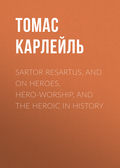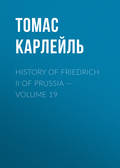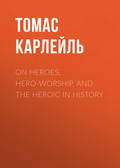
Томас Карлейль
Sacred Books of the East
CHAPTER XII
SELF
If a man hold himself dear, let him watch himself carefully; during one at least out of the three watches a wise man should be watchful.
Let each man direct himself first to what is proper, then let him teach others; thus a wise man will not suffer.
If a man make himself as he teaches others to be, then, being himself well subdued, he may subdue others; for one's own self is difficult to subdue.
Self is the lord of self, who else could be the lord? With self well subdued, a man finds a lord such as few can find.
The evil done by one's self, self-forgotten, self-bred, crushes the foolish, as a diamond breaks even a precious stone.
He whose wickedness is very great brings himself down to that state where his enemy wishes him to be, as a creeper does with the tree which it surrounds.
Bad deeds, and deeds hurtful to ourselves, are easy to do; what is beneficial and good, that is very difficult to do.
The foolish man who scorns the rule of the venerable (Arhat), of the elect (Ariya), of the virtuous, and follows a false doctrine, he bears fruit to his own destruction, like the fruits of the Katthaka reed.
By one's self the evil is done, by one's self one suffers; by one's self evil is left undone, by one's self one is purified. The pure and the impure stand and fall by themselves, no one can purify another.
Let no one forget his own duty for the sake of another's, however great; let a man, after he has discerned his own duty, be always attentive to his duty.
CHAPTER XIII
THE WORLD
Do not follow the evil law! Do not live on in thoughtlessness! Do not follow false doctrine! Be not a friend of the world.
Rouse thyself! do not be idle! Follow the law of virtue! The virtuous rest in bliss in this world and in the next.
Follow the law of virtue; do not follow that of sin. The virtuous rest in bliss in this world and in the next.
Look upon the world as you would on a bubble, look upon it as you would on a mirage: the king of death does not see him who thus looks down upon the world.
Come, look at this world, glittering like a royal chariot; the foolish are immersed in it, but the wise do not touch it.
He who formerly was reckless and afterwards became sober brightens up this world, like the moon when freed from clouds.
He whose evil deeds are covered by good deeds, brightens up this world, like the moon when freed from clouds.
This world is dark, few only can see here; a few only go to heaven, like birds escaped from the net.
The swans go on the path of the sun, they go miraculously through the ether; the wise are led out of this world, when they have conquered Mâra and his train.
If a man has transgressed the one law, and speaks lies, and scoffs at another world, there is no evil he will not do.
The uncharitable do not go to the world of the gods; fools only do not praise liberality; a wise man rejoices in liberality, and through it becomes blessed in the other world.
Better than sovereignty over the earth, better than going to heaven, better than lordship over all worlds, is the reward of Sotâpatti, the first step in holiness.
CHAPTER XIV
THE BUDDHA—THE AWAKENED
He whose conquest cannot be conquered again, into whose conquest no one in this world enters, by what track can you lead him, the Awakened, the Omniscient, the trackless?
He whom no desire with its snares and poisons can lead astray, by what track can you lead him, the Awakened, the Omniscient, the trackless?
Even the gods envy those who are awakened and not forgetful, who are given to meditation, who are wise, and who delight in the repose of retirement from the world.
Difficult to obtain is the conception of men, difficult is the life of mortals, difficult is the hearing of the True Law, difficult is the birth of the Awakened (the attainment of Buddhahood).
Not to commit any sin, to do good, and to purify one's mind, that is the teaching of all the Awakened.
The Awakened call patience the highest penance, long-suffering the highest Nirvâna; for he is not an anchorite (Pravra-gita) who strikes others, he is not an ascetic (Sramana) who insults others.
Not to blame, not to strike, to live restrained under the law, to be moderate in eating, to sleep and sit alone, and to dwell on the highest thoughts—this is the teaching of the Awakened.
There is no satisfying lusts, even by a shower of gold pieces; he who knows that lusts have a short taste and cause pain, he is wise; even in heavenly pleasures he finds no satisfaction, the disciple who is fully awakened delights only in the destruction of all desires.
Men, driven by fear, go to many a refuge, to mountains and forests, to groves and sacred trees.
But that is not a safe refuge, that is not the best refuge; a man is not delivered from all pains after having gone to that refuge.
He who takes refuge with Buddha, the Law, and the Church; he who, with clear understanding, sees the four holy truths: pain, the origin of pain, the destruction of pain, and the eightfold holy way that leads to the quieting of pain;—that is the safe refuge, that is the best refuge; having gone to that refuge, a man is delivered from all pain.
A supernatural person (a Buddha) is not easily found: he is not born everywhere. Wherever such a sage is born, that race prospers.
Happy is the arising of the Awakened, happy is the teaching of the True Law, happy is peace in the church, happy is the devotion of those who are at peace.
He who pays homage to those who deserve homage, whether the awakened (Buddha) or their disciples, those who have overcome the host of evils, and crossed the flood of sorrow, he who pays homage to such as have found deliverance and know no fear, his merit can never be measured by anyone.
CHAPTER XV
HAPPINESS
We live happily indeed, not hating those who hate us! among men who hate us we dwell free from hatred! We live happily indeed, free from ailments among the ailing! among men who are ailing let us dwell free from ailments!
We live happily indeed, free from greed among the greedy! among men who are greedy let us dwell free from greed!
We live happily indeed, though we call nothing our own! We shall be like the bright gods, feeding on happiness!
Victory breeds hatred, for the conquered is unhappy. He who has given up both victory and defeat, he, the contented, is happy.
There is no fire like passion; there is no losing throw like hatred; there is no pain like this body; there is no happiness higher than rest.
Hunger is the worst of diseases, the elements of the body the greatest evil; if one knows this truly, that is Nirvâna, the highest happiness.
Health is the greatest of gifts, contentedness the best riches; trust is the best of relationships, Nirvâna the highest happiness.
He who has tasted the sweetness of solitude and tranquillity, is free from fear and free from sin, while he tastes the sweetness of drinking in the law.
The sight of the elect (Ariya) is good, to live with them is always happiness; if a man does not see fools, he will be truly happy.
He who walks in the company of fools suffers a long way; company with fools, as with an enemy, is always painful; company with the wise is pleasure, like meeting with kinsfolk.
Therefore, one ought to follow the wise, the intelligent, the learned, the much enduring, the dutiful, the elect; one ought to follow such a good and wise man, as the moon follows the path of the stars.
CHAPTER XVI
PLEASURE
He who gives himself to vanity, and does not give himself to meditation, forgetting the real aim of life and grasping at pleasure, will in time envy him who has exerted himself in meditation.
Let no man ever cling to what is pleasant, or to what is unpleasant. Not to see what is pleasant is pain, and it is pain to see what is unpleasant.
Let, therefore, no man love anything; loss of the beloved is evil. Those who love nothing, and hate nothing, have no fetters.
From pleasure comes grief, from pleasure comes fear; he who is free from pleasure knows neither grief nor fear.
From affection comes grief, from affection comes fear; he who is free from affection knows neither grief nor fear.
From lust comes grief, from lust comes fear; he who is free from lust knows neither grief nor fear.
From love comes grief, from love comes fear; he who is free from love knows neither grief nor fear.
From greed comes grief, from greed comes fear; he who is free from greed knows neither grief nor fear.
He who possesses virtue and intelligence, who is just, speaks the truth, and does what is his own business, him the world will hold dear.
He in whom a desire for the Ineffable (Nirvâna) has sprung up, who in his mind is satisfied, and whose thoughts are not bewildered by love, he is called ûrdhvamsrotas (carried upwards by the stream).
Kinsmen, friends, and lovers salute a man who has been long away, and returns safe from afar.
In like manner his good works receive him who has done good, and has gone from this world to the other;—as kinsmen receive a friend on his return.
CHAPTER XVII
ANGER
Let a man leave anger, let him forsake pride, let him overcome all bondage! No sufferings befall the man who is not attached to name and form, and who calls nothing his own.
He who holds back rising anger like a rolling chariot, him I call a real driver; other people are but holding the reins.
Let a man overcome anger by love, let him overcome evil by good; let him overcome the greedy by liberality, the liar by truth!
Speak the truth, do not yield to anger; give, if thou art asked for little; by these three steps thou wilt go near the gods.
The sages who injure nobody, and who always control their body, they will go to the unchangeable place (Nirvâna), where, if they have gone, they will suffer no more.
Those who are ever watchful, who study day and night, and who strive after Nirvâna, their passions will come to an end.
This is an old saying, O Atula, this is not as if of to-day: "They blame him who sits silent, they blame him who speaks much, they also blame him who says little; there is no one on earth who is not blamed."
There never was, there never will be, nor is there now, a man who is always blamed, or a man who is always praised.
But he whom those who discriminate praise continually day after day, as without blemish, wise, rich in knowledge and virtue, who would dare to blame him, like a coin made of gold from the Gambû river? Even the gods praise him, he is praised even by Brâhman.
Beware of bodily anger, and control thy body! Leave the sins of the body, and with thy body practise virtue!
Beware of the anger of the tongue, and control thy tongue! Leave the sins of the tongue, and practise virtue with thy tongue!
Beware of the anger of the mind, and control thy mind! Leave the sins of the mind, and practise virtue with thy mind!
The wise who control their body, who control their tongue, the wise who control their mind, are indeed well controlled.
CHAPTER XVIII
IMPURITY
Thou art now like a sear leaf, the messengers of death (Yama) have come near to thee; thou standest at the door of thy departure, and thou hast no provision for thy journey.
Make thyself an island, work hard, be wise! When thy impurities are blown away, and thou art free from guilt, thou wilt enter into the heavenly world of the elect (Ariya).
Thy life has come to an end, thou art come near to death (Yama), there is no resting-place for thee on the road, and thou hast no provision for thy journey.
Make thyself an island, work hard, be wise! When thy impurities are blown away, and thou art free from guilt, thou wilt not enter again into birth and decay.
Let a wise man blow off the impurities of himself, as a smith blows off the impurities of silver, one by one, little by little, and from time to time.
As the impurity which springs from the iron, when it springs from it, destroys it; thus do a transgressor's own works lead him to the evil path.
The taint of prayers is non-repetition; the taint of houses, non-repair; the taint of complexion is sloth; the taint of a watchman, thoughtlessness.
Bad conduct is the taint of woman, niggardliness the taint of a benefactor; tainted are all evil ways, in this world and in the next.
But there is a taint worse than all taints—ignorance is the greatest taint. O mendicants! throw off that taint, and become taintless!
Life is easy to live for a man who is without shame: a crow hero, a mischief-maker, an insulting, bold, and wretched fellow.
But life is hard to live for a modest man, who always looks for what is pure, who is disinterested, quiet, spotless, and intelligent.
He who destroys life, who speaks untruth, who in the world takes what is not given him, who goes to another man's wife; and the man who gives himself to drinking intoxicating liquors, he, even in this world, digs up his own root.
O man, know this, that the unrestrained are in a bad state; take care that greediness and vice do not bring thee to grief for a long time!
The world gives according to their faith or according to their pleasure: if a man frets about the food and the drink given to others, he will find no rest either by day or by night.
He in whom that feeling is destroyed, and taken out with the very root, finds rest by day and by night.
There is no fire like passion, there is no shark like hatred, there is no snare like folly, there is no torrent like greed.
The fault of others is easily perceived, but that of one's self is difficult to perceive; a man winnows his neighbor's faults like chaff, but his own fault he hides, as a cheat hides the bad die from the player.
If a man looks after the faults of others, and is always inclined to be offended, his own passions will grow, and he is far from the destruction of passions.
There is no path through the air, a man is not a Samana outwardly. The world delights in vanity, the Tathâgatas (the Buddhas) are free from vanity.
There is no path through the air, a man is not a Samana outwardly. No creatures are eternal; but the awakened (Buddha) are never shaken.
CHAPTER XIX
THE JUST
A man is not just if he carries a matter by violence; no, he who distinguishes both right and wrong, who is learned and guides others, not by violence, but by the same law, being a guardian of the law and intelligent, he is called just.
A man is not learned because he talks much; he who is patient, free from hatred and fear, he is called learned.
A man is not a supporter of the law because he talks much; even if a man has learnt little, but sees the law bodily, he is a supporter of the law, a man who never neglects the law.
A man is not an elder because his head is gray; his age may be ripe, but he is called "Old-in-vain."
He in whom there is truth, virtue, pity, restraint, moderation, he who is free from impurity and is wise, he is called an elder.
An envious, stingy, dishonest man does not become respectable by means of much talking only, or by the beauty of his complexion.
He in whom all this is destroyed, and taken out with the very root, he, when freed from hatred, is called respectable.
Not by tonsure does an undisciplined man who speaks falsehood become a Samana; can a man be a Samana who is still held captive by desire and greediness?
He who always quiets the evil, whether small or large, he is called a Samana (a quiet man), because he has quieted all evil.
A man is not a mendicant (Bhikshu) simply because he asks others for alms; he who adopts the whole law is a Bhikshu, not he who only begs.
He who is above good and evil, who is chaste, who with care passes through the world, he indeed is called a Bhikshu.
A man is not a Muni because he observes silence if he is foolish and ignorant; but the wise who, as with the balance, chooses the good and avoids evil, he is a Muni, and is a Muni thereby; he who in this world weighs both sides is called a Muni.
A man is not an elect (Ariya) because he injures living creatures; because he has pity on all living creatures, therefore is a man called Ariya.
Not only by discipline and vows, not only by much learning, not by entering into a trance, not by sleeping alone, do I earn the happiness of release which no worldling can know. O Bhikshu, he who has obtained the extinction of desires has obtained confidence.
CHAPTER XX
THE WAY
The best of ways is the eightfold; the best of truths the four words; the best of virtues passionlessness; the best of men he who has eyes to see.
This is the way, there is no other that leads to the purifying of intelligence. Go on this path! This is the confusion of Mâra, the tempter.
If you go on this way, you will make an end of pain! The way preached by me, when I had understood the removal of the thorns in the flesh.
You yourself must make an effort. The Tathâgatas (Buddhas) are only preachers. The thoughtful who enter the way are freed from the bondage of Mâra.
"All created things perish," he who knows and sees this becomes passive in pain; this is the way to purity.
"All created things are grief and pain," he who knows and sees this becomes passive in pain; this is the way that leads to purity.
"All forms are unreal," he who knows and sees this becomes passive in pain; this is the way that leads to purity.
He who does not rouse himself when it is time to rise, who, though young and strong, is full of sloth, whose will and thought are weak, that lazy and idle man never finds the way to knowledge.
Watching his speech, well restrained in mind, let a man never commit any wrong with his body! Let a man but keep these three roads of action clear, and he will achieve the way which is taught by the wise.
Through zeal knowledge is gained, through lack of zeal knowledge is lost; let a man who knows this double path of gain and loss thus place himself that knowledge may grow.
Cut down the whole forest of desires, not a tree only! Danger comes out of the forest of desires. When you have cut down both the forest of desires and its undergrowth, then, Bhikshus, you will be rid of the forest and of desires!
So long as the desire of man towards women, even the smallest, is not destroyed, so long is his mind in bondage, as the calf that drinks milk is to its mother.
Cut out the love of self, like an autumn lotus, with thy hand! Cherish the road of peace. Nirvâna has been shown by Sugata (Buddha).
"Here I shall dwell in the rain, here in winter and summer," thus the fool meditates, and does not think of death.
Death comes and carries off that man, honored for his children and flocks, his mind distracted, as a flood carries off a sleeping village.
Sons are no help, nor a father, nor relations; there is no help from kinsfolk for one whom death has seized.
A wise and well-behaved man who knows the meaning of this should quickly clear the way that leads to Nirvâna.
CHAPTER XXI
MISCELLANEOUS
If by leaving a small pleasure one sees a great pleasure, let a wise man leave the small pleasure, and look to the great.
He who, by causing pain to others, wishes to obtain pleasure for himself, he, entangled in the bonds of hatred, will never be free from hatred.
What ought to be done is neglected, what ought not to be done is done; the desires of unruly, thoughtless people are always increasing.
But they whose whole watchfulness is always directed to their body, who do not follow what ought not to be done, and who steadfastly do what ought to be done, the desires of such watchful and wise people will come to an end.
A true Brâhmana goes scathless, though he have killed father and mother, and two valiant kings, though he has destroyed a kingdom with all its subjects.
A true Brâhmana goes scathless, though he have killed father and mother, and two holy kings, and an eminent man besides.
The disciples of Gotama (Buddha) are always well awake, and their thoughts day and night are always set on Buddha.
The disciples of Gotama are always well awake, and their thoughts day and night are always set on the law.
The disciples of Gotama are always well awake, and their thoughts day and night are always set on the church.
The disciples of Gotama are always well awake, and their thoughts day and night are always set on their body.
The disciples of Gotama are always well awake, and their mind day and night always delights in compassion.
The disciples of Gotama are always well awake, and their mind day and night always delights in meditation.
It is hard to leave the world to become a friar, it is hard to enjoy the world; hard is the monastery, painful are the houses; painful it is to dwell with equals to share everything in common, and the itinerant mendicant is beset with pain. Therefore let no man be an itinerant mendicant, and he will not be beset with pain.
A man full of faith, if endowed with virtue and glory, is respected, whatever place he may choose.
Good people shine from afar, like the snowy mountains; bad people are not seen, like arrows shot by night.
Sitting alone, lying down alone, walking alone without ceasing, and alone subduing himself, let a man be happy near the edge of a forest.







